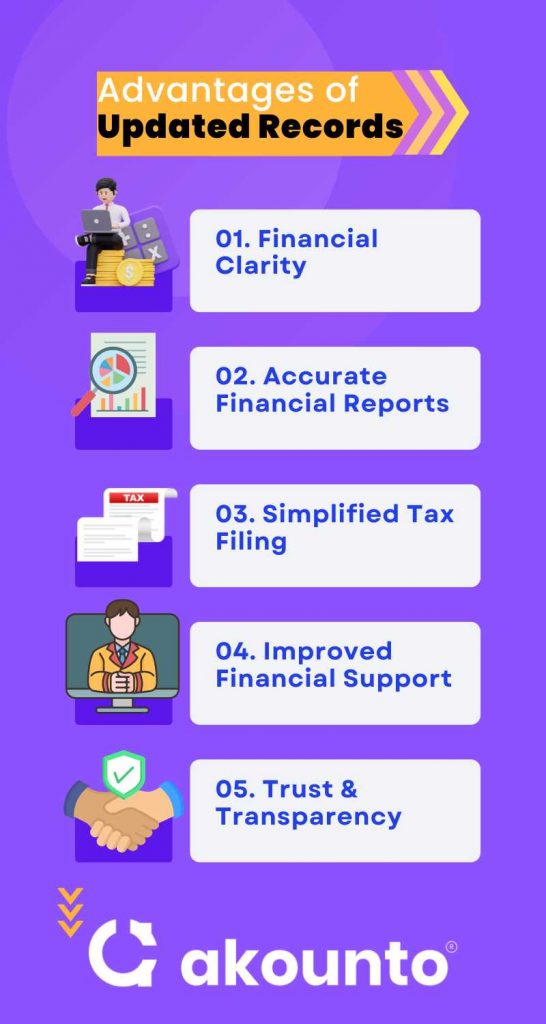Understanding Catch-Up Bookkeeping
Catch-up bookkeeping refers to updating and reconciling the company’s accounting records that have fallen behind to bring them up to date.
[ez-toc]
As a small business owner, it’s quintessential to maintain accurate bookkeeping as it forms the foundation of your business’s finances.
Due to time constraints or a lack of skilled bookkeepers, the books may not be regularly updated, leading to a bookkeeping backlog. This is where catch-up bookkeeping comes in, allowing you to manage your overdue bookkeeping tasks intelligently.
In a business, there could be a few years or months of transactions that haven’t been properly recorded, which includes everything from business expenses; bank accounts transactions, customer accounts, credit card statements related to business expenditure, and other financial data crucial for business.
The catch-up process involves entering all the transactions into an accounting system and reviewing and reconciling them. The goal is to provide accurate financial statements reflecting the true state of business finances, which is a key requirement, especially as the tax season rolls around.
The process of catch-up bookkeeping might sound overwhelming, especially if there are large unclassified transactions, but leveraging professional catch-up bookkeeping services or modern bookkeeping software can make this task manageable and more efficient.
Maintaining your books up to date is not just about compliance, but it also aids in better financial control, timely tax submissions, and identifying potential tax deductions.
Advantages of Updated Records

- Financial Clarity: Updated records offer insights into your business’s financial health, including cash flow, profits, losses, business liabilities, assets, and overall financial stability.
- Accuracy of Financial Reports: Regularly updated records ensure that your financial statements accurately reflect your business’s financial status. Inaccurate financial reports can lead to misinformed decisions, which could negatively impact your business in the long run.
- Simplified Tax Filing: Well-maintained and updated records simplify the process of filing tax returns, helping you accurately identify all eligible tax deductions and minimize the risk of errors during tax preparation.
- Obtaining Financial Support: Lenders will require updated financial records if you’re seeking financial assistance, like a business loan. These records demonstrate your business’s ability to repay the loan and are thus essential for securing financial support.
- Maintaining Trust and Transparency: Updated records help foster transparency and trust with key stakeholders, including employees, investors, customers, and vendors. Everyone involved in your business benefits from the assurance that the financials are accurately maintained and up to date.
Challenges in Catch-Up Bookkeeping
- Volume of transactions: Catching up on bookkeeping may involve dealing with many transactions, especially if you’re several months or years behind on your books. This can make the process seem daunting and time-consuming.
- Missing Documentation: Missing invoices, bank statements, or credit card statements related to business expenditures can hinder the process. It’s crucial to track down all your receipts and transaction records to ensure accuracy.
- Distinguishing Personal and Business Expenses: For small business owners, it can be challenging to separate personal and business expenses, especially if they use the same accounts for both. Failing to demarcate expenses could result in a deductible business expense being overlooked.
- Lack of Accounting Knowledge: Understanding bookkeeping and accounting principles is necessary for historical bookkeeping. If these principles are not well understood, it can lead to errors in the financial reports, affecting the business’s financial health.
- Incorrect Reconciliation: Reconciliation of bank accounts, credit card accounts, and customer accounts must be accurate. Mistakes in reconciliation can lead to inaccurate financial statements.
- Time Constraints: Catch-up bookkeeping is a time-consuming process. Small business owners often struggle to find the time to handle this task on top of their other responsibilities, leading to a prolonged bookkeeping backlog.
Accounting Principles and Guidelines

When performing catch-up bookkeeping, following certain accounting principles and guidelines is crucial to ensure accuracy and consistency. Here are some key principles to consider:
- Accrual Principle: The accrual principle states that expenses and revenues should be recorded when they are incurred, irrespective of cash exchange. This method provides an accurate picture of a business’s financial situation.
- Consistency Principle: According to this principle, once a business chooses an accounting method, it should consistently use it for all financial reporting. This provides a uniform basis for comparing financial statements over time.
- Economic Entity Principle: This principle emphasizes separating personal and business expenses. A business and its owner are considered separate entities, and their transactions should be recorded separately.
- Matching Principle: This requires businesses to match their expenses with revenues. For instance, sales commissions should be recorded in the same period as the sales they helped generate.
- Materiality Principle: According to this principle, all significant items must be reported in the financial statements. An item is considered important if its omission or misstatement could impact the economic decisions of users.
- Reliability Principle: This principle states that the financial statements of a business should be verifiable and free from bias or error. It underscores the importance of accurate bookkeeping and data recording.
- Time Principle: This principle asserts that a business should report its financial results over a specific period. This allows for comparison and analysis of business performance over time.
Accounting Software for Financial Reporting
Accounting software plays an important role in ensuring efficiency and accuracy in the context of catch-up bookkeeping. It helps automate and streamline bookkeeping tasks, reducing the risk of human error and providing up-to-date financial data for reporting.
Here’s how accounting software can assist in financial reporting during catch-up bookkeeping:
- Automated Data Entry: Accounting software automates the process of entering transactions, which can significantly reduce the time required to catch up on overdue bookkeeping. This feature is especially valuable when dealing with a large volume of transactions.
- Real-Time Updates: These platforms provide real-time updates on your business’s finances, giving you an up-to-date view of your financial situation. This feature is particularly useful when you’re behind on your books and must rapidly update your records.
- Ease of Reconciliation: Accounting software often comes with tools that facilitate the reconciliation of bank accounts, credit card accounts, and customer accounts. This feature is integral to catch-up bookkeeping as it helps ensure accurate financial statements.
- Tax Preparation: Having updated and accurate financial data is essential as tax season rolls around. Accounting software can help categorize transactions for tax purposes, track deductible business expenses, and generate reports needed for tax filing.
- Financial Reporting: Once your books are current, the software can generate financial reports such as income statements, balance sheets, and cash flow statements. These reports provide insights into the financial health of your business.
- Integration with Other Systems: Many accounting software can integrate with other business systems like payroll, inventory, and CRM. This integration allows for comprehensive and cohesive financial reporting.
Catch-Up Bookkeeping Services: Factors to Consider
- Experience with Small Businesses: Each business has unique requirements. Services that understand the dynamics of small businesses can customize their approach, ensuring a tailored solution for your catch-up project.
- Understanding of Finance and Accounting Principles: This knowledge is crucial for accurately recording transactions in your company’s accounting records. Look for services that have a strong foundation in these principles.
- Handling of Overdue Payments: There might be overdue payments if you’re behind on your books. Services should be equipped to identify and rectify these promptly.
- Ability to Work with Company Records: Catch-up bookkeeping services should be adept at working with different company records, including bank statements.
- Tax Professional Availability: Tax season can add more complexity to the catch-up process. Services that have tax professionals on board can help handle tax-related issues efficiently, making a huge difference.
- Identification of Deductible Business Expenses: Not all expenses are created equal. The right service will identify deductible business expenses, potentially saving some part of taxes.
- Management of Corresponding Transactions: Every transaction has a corresponding book entry. Skilled bookkeeping services ensure that all entries are made accurately, avoiding discrepancies down the line.
- Suitability for a Growing Business: Your catch-up bookkeeping needs may change as your business grows. Look for services that can scale with you, ensuring they can handle your requirements now and in the future.
Catch-up vs Clean-up Bookkeeping
| Catch-Up Bookkeeping | Clean-up Bookkeeping | |
| Definition | Catch-up bookkeeping involves updating and reconciling company accounting records that have fallen behind, in order to bring them up to date. | Clean-up bookkeeping refers to the process of correcting errors and inconsistencies in financial records, ensuring the accuracy of the books. |
| Need | When a business hasn’t kept up with regular bookkeeping due to reasons such as lack of time or skill. It’s often a result of being behind on your books. | When there are inconsistencies or errors in the books, such as incorrect entries or misclassified transactions. |
| Major Tasks | Tasks include recording past transactions, reconciling bank statements, identifying deductible business expenses, and bringing overdue payments up to date. | Tasks in a clean-up bookkeeping project involve identifying and rectifying discrepancies, reclassifying incorrectly categorized transactions, and rectifying errors in data entry. |
| Beneficiaries | Small business owners or growing businesses that haven’t been able to keep their books updated due to various constraints benefit from this. | This service benefits businesses that have bookkeeping errors due to mistakes, negligence, or lack of proper bookkeeping knowledge. |
| Challenges | Handling a large volume of transactions, separating personal and business expenses, and time constraints. | Detecting errors, understanding the source of discrepancies, and correcting them without disturbing the integrity of the books. |
| Outcome | Up-to-date financial and accounting books, providing an accurate snapshot of the business’s financial health. | Error-free, clean, and accurate financial records, offering reliability and clarity in financial decision-making. |
| Role of Professionals | Tax professionals and bookkeeping services can assist in managing a catch-up project efficiently, ensuring accuracy and compliance. | Bookkeeping services or accounting professionals play a key role in identifying and fixing errors, and ensuring accurate and reliable company records. |
Conclusion
Catch-up bookkeeping is essential for business owners to update company accounting records, rectify inaccurate financial statements, manage overdue bookkeeping, and ensure better financial control. Leveraging catch-up bookkeeping services or bookkeeping software allows efficient handling of business expenditures, tax preparations, and maintaining books up to date, ensuring a healthy cash flow and smooth tax filing during tax season.
Visit the Akounto blog section to catch-up with the latest accounting topics.




